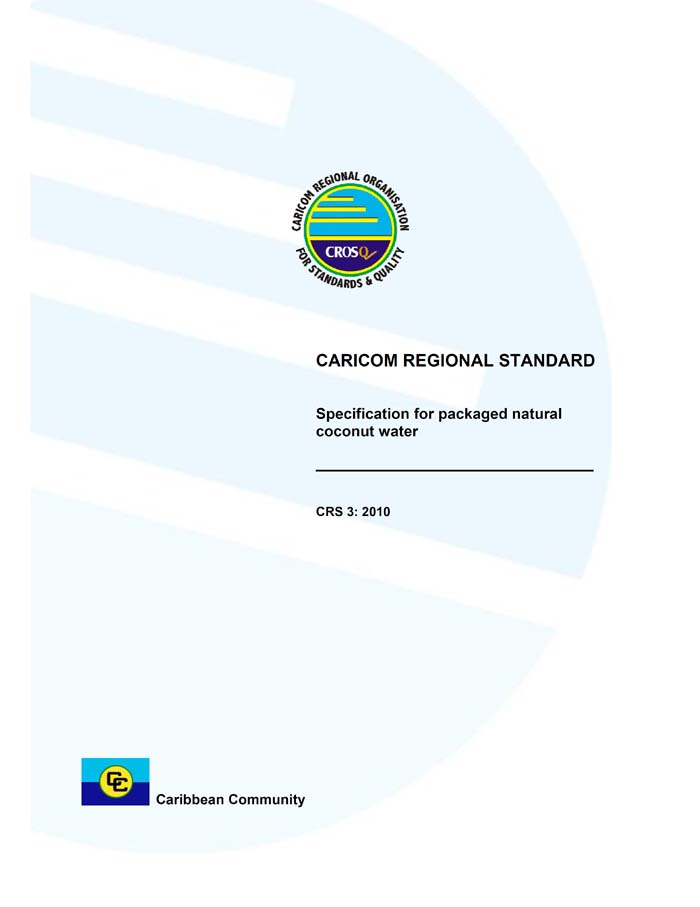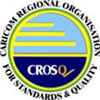
In order to promote public education and public safety, equal justice for all, a better informed citizenry, the rule of law, world trade and world peace, this legal document is hereby made available on a noncommercial basis, as it is the right of all humans to know and speak the laws that govern them.


CARICOM Regional Organisation for Standards and Quality (CROSQ)
2nd Floor Nicholas House
29 & 30 Broad Street
Bridgetown, St Michael
Barbados
T: 246.622.7670 | F: 246.622.7678
Website: http://www.crosq.org
© CROSQ 2010 – All rights reserved
Unless otherwise specified, no part of this publication may be reproduced or utilized in any form or by any means, electronic or mechanical, including photocopying and microfilm, without permission.
CRS 3: 2010
CARICOM Regional Organisation for Standards and Quality (CROSQ)
2nd Floor, Nicholas House
29 & 30 Broad Street
Bridgetown, St. Michael
Barbados
T: 246.622.7670 | F: 246.622.7678
Website: http://www.crosq.org
© CROSQ 2010 – All rights reserved. No part of this publication is to be reproduced without the prior written consent of CROSQ.
ISBN 978-976-8234-15-5
ICS 67.120.20
| AMENDMENT NO. | DATE OF ISSUE | TYPE OF AMENDMENT | NO. OF TEXT AFFECTED | TEXT OF AMENDMENT |
|---|---|---|---|---|
This CARICOM Regional Standard was developed under the supervision of the Regional Technical Committee for Foods (RTC 3) by Sub-Committee C - Coconut Water (hosted by the CARICOM Member State, Jamaica) which at the time comprised the following members:
| Members | Representing |
|---|---|
| Mr. Donald Hinds (Chairperson) | Food Storage & Prevention Infestation Division, Ministry of Industry, Investment & Commerce |
| Dr. Donna Minott-Kates (Vice Chairperson) | University of the West Indies, Mona Campus |
| Ms. Bernadette Ambrose | Caribbean AgriBusiness Association |
| Mr. Vaughn Barnaby | Rural Agricultural Development Authority |
| Mr. Sean Black | Caribbean AgriBusiness Association |
| Mr. Pash Fuller | Consumer Affairs Commission |
| Mr. Anthony HoSang | Bonfire Farms |
| Ms. Jacqueline Morgan | Heart Rinse |
| Mr. Lorrel Palmer | Nu-Taste |
| Mr. Leo Stone | Magnacorp Investments Limited |
| Mrs. Marchelle Turner-Pitt | Ministry of Health & Environment |
| Mrs. Vonetta Nurse Thompson (Technical Secretary) | Bureau of Standards Jamaica |
| Foreword | 1 | ||
| 1 | Scope | 2 | |
| 2 | Normative references | 2 | |
| 3 | Terms and definitions | 2 | |
| 4 | Specifications | 3 | |
| 4.1 | Harvesting | 3 | |
| 4.2 | Composition | 3 | |
| 4.3 | Physiochemical limits | 3 | |
| 4.4 | Microbiological limits | 3 | |
| 4.5 | Organoleptic requirements | 4 | |
| 4.6 | Defective product | 4 | |
| 5 | Quality control | 4 | |
| 6 | Food additives | 4 | |
| 7 | Contaminants | 4 | |
| 8 | Hygiene | 5 | |
| 9 | Labelling | 5 | |
| List of tables | |||
| Table 1 — Composition of coconut water | 3 | ||
| Table 2 — Physiochemical limits for coconut water | 3 | ||
| Table 3 — Microbiological limits for coconut water | 4 | ||
This Standard was prepared through the CARICOM Regional Organisation for Standards and Quality (CROSQ) in order to outline the specifications for packaged natural coconut water offered for sale in CARICOM Member States.
It was necessary to develop this standard so as to streamline the industry and clearly differentiate the product of undiluted natural coconut water.
This document must be read in conjunction with the CARICOM Regional Code of Practice, CRCP 2, Code of hygienic practice for packaged natural coconut water.
It was approved by the Thirtieth Meeting of the Council for Trade and Economic Development on 3-4 March 2010.
In the development of this standard, assistance was derived from the following:
This standard applies to packaged natural coconut water, as defined in clause 3, which is offered for consumption. It only applies to coconut water which has been packaged in its natural state without the use of additives.
The following referenced documents are indispensable for the application of this document. The latest edition of the referenced documents (including any amendments) applies.
CARICOM Regional Code of Practice, CRCP 2, Code of hygienic practice for packaged natural coconut water
CARICOM Regional Standard, CRS 5, Labelling standard for pre-packaged foods
CARICOM Regional Standard Code of Practice, CRS 6, General principles of food hygiene
CODEX Alimentarius Commission, Pesticide residues in food - Maximum residue limits
For the purposes of this standard the following terms and definitions shall apply.
substance, natural or artificial, added to the product to enhance its quality or preservation
undiluted, natural, untreated clear liquid endosperm of the coconut
physical, chemical and biological matter which is not naturally found in the product
untreated coconut water without the use of additives
clear to translucent
coconut water filled into hermetically sealed containers of various compositions, forms and capacities
white tissue of coconut
2Processors shall ensure that coconuts used for the commercial packaging of natural coconut water are harvested between seven to nine months after pollination. Free fall of coconuts shall not be allowed; coconuts shall be lowered to the ground.
Packaged natural coconut water shall be composed of the undiluted, natural, untreated, clear liquid endosperm of the coconut, excluding the solid endosperm.
The composition of packaged natural coconut water shall be as outlined in Table 1.
| Total Solids | Range g/100 ml |
|---|---|
| Reducing sugar | 3.19 - 5.50 |
| Non-reducing sugar | 0.28 - 1.44 |
| Total sugars | 3.34 - 6.52 |
| Organic acids a | 0.072 - 0.090 |
| Total fat | 0.55 - 1.55 |
| Ash | 0.39 - 0.84 |
| aTitratable acidity (expressed as citric acid) | |
Packaged natural coconut water shall be in conformity with the physiochemical quality specifications outlined in Table 2.
| Parameter at 25° C | Limits min - max |
|---|---|
| pH | 4.6 - 5.5 |
| °Brix | 3.8 - 6.9 |
Packaged natural coconut water shall be in conformity with the microbiological quality specifications outlined in Table 3.
3| Parameter | Microbiological limits colonies/ml |
|---|---|
| Total Aerobic Plate Count | <5.0 × 103 |
| Total coliform | <1.0 × 10 |
| Faecal coliform | Absent |
| Escherichia coli | Absent |
| Yeast & mould | <1.0 × 10 |
| Staphylococcus aureus | Absent |
| Salmonella | Absent |
The coconut water shall have the normal colour, flavour and odour characteristic of the product.
Packaged natural coconut water that fails to meet one or more of the applicable quality requirements, as outlined in 4.1 to 4.5 shall be considered as defective.
Quality control shall be performed as outlined in 14 of CRCP 2.
No natural or artificial substance or ingredient shall be added to the coconut water to enhance its quality or preservation. Chemicals present in the product should only be those present as a result of the natural development of the fruit while on the tree.
Packaged natural coconut water shall:
All steps in the packaging of coconut water shall be performed without unnecessary delay and under conditions which shall prevent the possibility of contamination, deterioration or the development of pathogenic and spoilage micro-organisms.
Products covered by the provisions of this standard shall be prepared and handled in accordance with the appropriate sections of CRS 4 and CRS 6.
The labelling of packaged natural coconut water shall be in accordance with CRS 5. In addition, the following specific provisions apply:

The CARICOM Regional Organisation for Standards and Quality (CROSQ) was created as an Inter-Governmental Organisation by the signing of an agreement among fourteen Member States of the Caribbean Community (CARICOM). CROSQ is the regional centre for promoting efficiency and competitive production in goods and services, through the process of standardization and the verification of quality. It is the successor to the Caribbean Common Market Standards Council (CCMSC), and supports the CARICOM mandate in the expansion of intra-regional and extra-regional trade in goods and services.
CROSQ is mandated to represent the interest of the region in international and hemispheric standards work, to promote the harmonization of metrology systems and standards, and to increase the pace of development of regional standards for the sustainable production of goods and services in the CARICOM Single Market and Economy (CSME), and the enhancement of social and economic development.
CROSQ VISION:
The premier CARICOM organisation for the development and promotion of an Internationally Recognised Regional Quality Infrastructure; and for international and regional harmonized CARICOM Metrology, Standards, Inspection, Testing and Quality Infrastructure
CROSQ MISSION:
The promotion and development of standards and standards related activities to facilitate international competitiveness and the sustainable production of goods and services within the CARICOM Single Market and Economy (CSME) for the enhancement of social and economic development
6 7